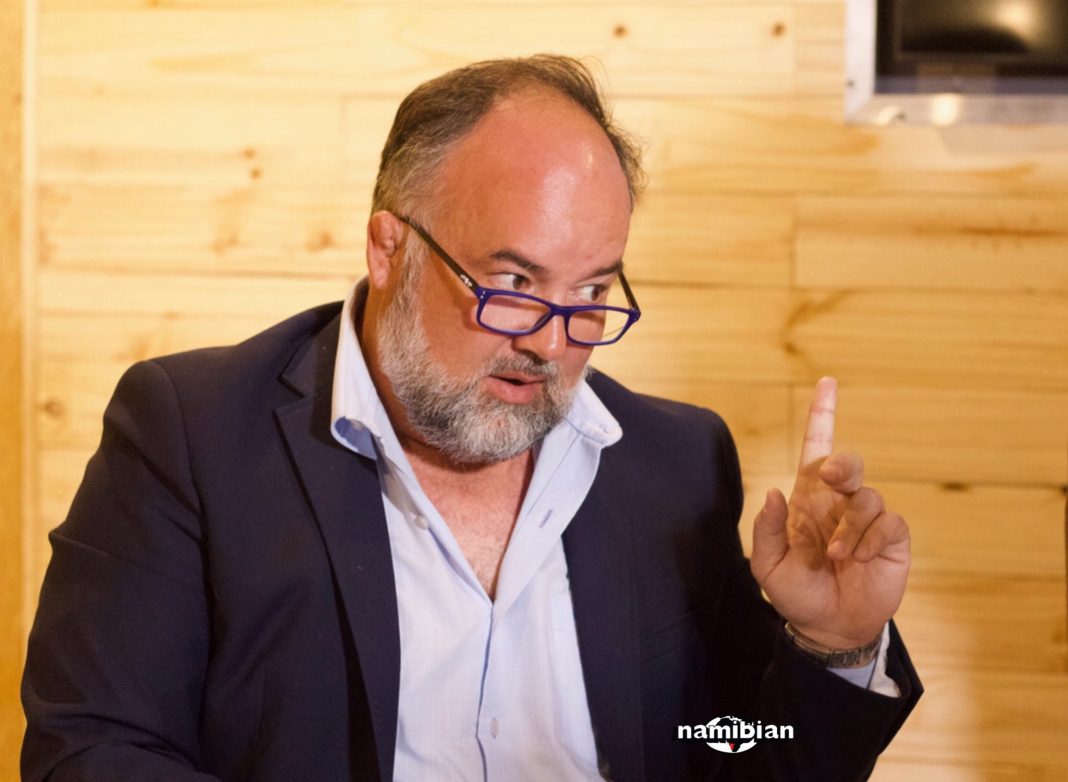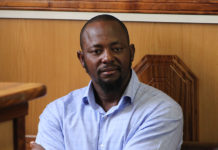By Shinovene Immanuel | 15 October 2020
Fishing businessman Adriaan Louw had an interview with The Namibian’s Shinovene Immanuel last week on wide-ranging issues such as his partnership, alleged Fishrot links and his relationship with lawyer Marén de Klerk.
He believes previous media reports were unfair to his business which has been rocked by the Fishrot scandal.
We asked him several questions. Here is what he had to say:
The Namibian (TN) : Who is Adriaan Louw?
Adriaan (AJ) Louw: Adriaan Jacobus Louw is a Namibian businessman, farmer and family man. My business interests comprise Angola, Namibia and South Africa and range from the fishing industry, logistics to farming. More than 30 years ago I started my first business in Angola and have never looked back. My experience in the fishing industry was acquired by working my way up from the bottom to the top. It is not a simple business to master and various risk factors play a role, Mother Nature being one of them.
TN: You partnered with Fishcor in setting up a company called Seaflower Pelagic Proccesung (SPP). That partnership is now being terminated. How did your involvement in SPP start?
AJ: My business partner, Johan Breed, was approached by a South African Investec portfolio manager in the third quarter of 2016 and was asked if AST Angola would be interested to meet with Fishcor from Namibia. Fishcor had plans to build a land based pelagic fishing plant and according to the information, they were looking for business partners that understood the risks and had the necessary expertise. Fishcor also did not have the required capital to fund such an endeavour. We were informed that local Namibian businesses’ were already approached and had declined the proposed project. We set up a meeting and site visit at our plants in Angola. I was introduced to James Hatuikulipi and Mike Nghipunya during this trip. I took them through our land based pelagic plant and they were very impressed. We employ 1800 Angolan workers and that was very important to them. I must add that we vetted James and Mike before they were invited and both gentlemen had prominent positions. James was the head of Investec Namibia and clearly trusted.
TN: You seem to hit the jackpot back then by being selected by Fishcor to partner the state and get free quotas for 15 years (with option for additional 15 years). This partnership was never publicly advertised. The total value of fish is around N$20 billion for 30 years. Do you want to put these figures into context?
AJ: We did not just one day decide to partner with Fishcor. Fishcor could not contribute enough capital to take the majority share in the joint venture, which was a risk for African Selection Trust (AST). Fishcor could only contribute the land. The bulk of the investment, expertise and time value of carrying such a big project during the construction phase rested squarely on our shoulders. One of the main aims of the project was to employ Namibian citizens.
The feasibility of the factory and job creation required quota to sustain it and was based on 50 000 metric ton of quota to achieve this result. Although the project stated employment of maximum 700 we envisaged to employ more than 1 100 Namibians by end 2020
The public also seem to forget that Fishcor owned 40% of this plant which means that once up and running, they would benefit as a business partner. The idea was that Namibian citizens would benefit directly from their own resources. Skills development and empowerment of women and youth were a priority.
We also entered into a quota usage agreement, which meant that Fishcor would earn 8% quota usage fee (higher than market related for wet quota) over and above their 40% shareholding. Fishcor would thus earn directly from the joint venture in terms of the quota allocation.
So, to put the above in context, Fishcor and the Namibian government would benefit greatly as a 100% state owned company from their 40% shareholding in terms of profit, consistent income from their 8% usage fee and would be jointly responsible for the creation of maximum 700 jobs.
From our side, we put in the investment, brought the expertise to develop the plant, purchased equipment and project managed the building of the plant. The mere fact that we were partnering with a parastatal affected our risk profile with our other businesses and these risks had to be mitigated.
We therefore dispute the value of N$20 billion mentioned in The Namibian. The value is non-sensical and confuses the public. We are an operating company and subject to profit and loss. A land-based plant has higher overheads than the freezer based operation but it secures more employment and value add to the Namibian economy. The value is not even achievable if the quota is sold outright, and it is further contrary to the aim of the project.
The project was further subject to the Competition Commission approval, which approval was obtained on 8 June 2017.
TN: What was the value of that 30 year partnership?
AJ: The value of a land-based plant is not comparable to a freezer-based operation. A land- based plant comes with very high investment costs and the true value is unlocked over time as and when the plant runs optimally. The more quota that can be put through the plant, the higher the success. The plant will also procure related businesses and stimulate the fishing economy. The factory was built to support the NDP5 objectives and assist in job creation. Job creation leads to housing needs and stimulates the local business needs. The factory was designed and built on a minimum of 50 000 MT capacity to sustain these objectives.
TN: A high court judge described the joint venture between you and Fishcor as “cosy”and “parasitic”. This was quite damning. To that you say?
AJ: Personally I was very disappointed, as the validity of the contracts were not part of the urgent application that was brought before this court. The judge confirmed that he was requested to rule on the validity of the contracts. Fishcor played a cat and mouse game with us the entire year and we had no choice but to have them commit and give us a straight answer. To be honest, this was the first time that we received any indication that Fishcor questioned the validity of the agreements or that they were considering a divorce. The joint venture was suffering and Fishcor’s non-compliance of their fiduciary duties paralysed the business and created job insecurity. My legal team have however explained that these remarks were obiter in his judgement or in layman’s terms, these were remarks made in passing.
TN: In fact, deputy judge president Hosea Angula said the “directing minds”in control of Seaflower Pelagic when the company concluded a quota usage agreement with fishcor should have known that Fishcor’s undertaking to make 50 000 tonnes of horse mackerel available to Seaflower each year for 15 years ”would only be possible under a corrupt”. Another damning statement from the court. What do you think of this?
AJ: Again, I must state that these statements disappointed me, as the joint venture was a project that should have benefitted the Namibian Public. We built the largest sub-saharan land based plant on our part and employed 655 people and advertised for a further 450 workers for our canning factory.
The directing minds of African Selection Trust (AST) at the time of inception of this project were proud of what was envisaged and the government through the Cabinet endorsed the project by name and in duly promulgated government Gazettes. From a risk perspective we were satisfied with the undertakings by the government and proceeded with the investment.
African Selection Trust (AST) was approached by Fishcor to enter into this joint venture, and not the other way around. The Government and Fishcor had set the parameters and AFSN brought the expertise and the investment.
TN: The government has decided to terminate the Seaflower Pelagic Processing partnership. Are you sour?
AJ: I need to clarify this. We have had no correspondence from the government on this matter. Fishcor has attempted to repudiate the agreements but we are disputing their repudiation. The concept of divorce is also up for questioning. In terms of Company Law, such a divorce has to be legally managed and it cannot be achieved by one party walking away from their shareholding and fiduciary responsibilities. I prefer the term corporate sabotage at present but remain hopeful that an amicable solution can be found. To answer your question. I am not sour, I am disappointed in the way that the government through Fishcor has handled the matter.
TN: Are you planning to reject the termination or are you going to force it and stay in a sour relationship?
AJ: The matter is sub judice but I can confirm that we have rejected the repudiation and have put Fishcor to terms. We believe in the rule of law and it will take its course. I do not believe it is feasible to force anyone to stay in a sour marriage. We remain open to amicable solutions being found and will continue with our original aim to operate a successful land- based plant that believes in increased employment of Namibian citizens.
TN: What is your plan now? Go on your own and buy fishing quotas from the market?
AJ: Step one is to legally divorce Fishcor. The damages will be determined and demanded. The business will go on. I believe that this matter will serve as precedent for any future joint ventures with the Namibian Government and determine external investor confidence in the country.
TN: How much did your company invest in this partnership? Kindly provide us with proof.
AJ: We have provided you with the Independent Forensic investigation compiled by ProNam Forensic Services. In fact we have provided the government with this report. Minister Leon Jooste and Minister Albert Kawana received the report. The investment was scrutinised and the forensic auditor had unfettered access to our bank accounts and the company financials. We gave Government weeks to consider the report as a gesture of goodwill from our side, and to our surprize no engagement happened.
In short we have invested N$240 million in the plant and equipment, N$250 million in the two RSW vessels and a further N$100 million in the property adjacent to the plant.
TN: Take us through the partnership ownership structure. Provide us with the beneficial owners.
AJ: Seaflower Pelagic Factory ownership:
-
60% African Selection Fishing Namibia
-
40% Fishcor
African Selection Fishing Namibia
-
95% AJ Louw
-
5% African Selection Trust (AST).
Note: Celax Investment Number One owned 33% of African Selection Fishing Namibia as Louw reclaimed shares from Marén de Klerk.
TN: One of the shareholders in African Selection Trust Namibia was Celax Investment Number One is named in Fishrot court papers of being used as a conduit to divert N$75 million from Fishcor. Why are you insisting that Seaflower Pelagic Processing is not part of Fishrot?
AJ: When the business structure was determined for the joint venture, we were informed that in terms of the NDP 5 and the proposed New Equitable Economic Empowerment Framework (NEEEF) requirements, we would require minority groups in the structure.
We were advised by our then attorney, Mr De Klerk, that we should set up a company that could manage this group from a compliance perspective and board representation level. Celax was formed and the only shareholder and director of this company was Maren de Klerk. However, this company was only to be active once we could finalise the NEEEF requirements, which to date has not happened. Mr De Klerk signed yearly confirmations that Celax was not active and would be finalised only when we had a better picture of the final NEEEF act. We were not aware that Celax was used and in fact in operation. Upon Mr De Klerk’s sudden resignation in January 2020, the shares were transferred back to African Selection Fishing. We only became aware of the involvement through media articles. The forensic auditor investigated this as well.
TN: How did you not know what Celax Investment Number One?
AJ: De Klerk was the only director and shareholder and as mentioned, this company was a specific vehicle that was supposed to be dormant until NEEEF was promulgated in its final form. Mr De Klerk declared this in yearly declarations to the board and our compliance department. A dormant company is not supposed to have a bank account so we did not expect this.
TN: Tell us more about Celax Investment Number One. Why was it started and who were the BEE partners?
AJ: It was set up as an empowerment vehicle. The idea was that it would benefit community groups, veterans, women and the youth. The NEEEF act kept being postponed and new versions were suggested, so we could not finalise the beneficiaries of Celax. We received a few suggestions of groups that we could accommodate and I specifically wanted my Karas community to benefit as I have invested in the community already. We had great ideas how to responsibly achieve this, but then the Fishrot scandal happened, and we have not been able to further this narrative.
TN: How close were you with James Hatuikulipi, Sacky Shanghala, Bernhard Esau and Marén de Klerk.
AJ: James was a business associate and fellow board member in SPP. I was not close to the two ministers. Maren De Klerk was my attorney and he transferred property as a conveyancer and assisted in other commercial contracts. I never expected that he would turn out to have been part of corrupt activity. I trusted him. I am very disappointed in him.
TN: You knew that Marén de Klerk was politically exposed. A simple Google search might have shown you that he was Shanghala’s personal lawyer. Shanghala was a business partner and close friend to Hatuikulipi who you made business with. Why did you ignore that red flag?
AJ: I met Maren de Klerk in 2014 after he was referred by a by another well recognised attorney. After this he became my personal commercial lawyer. I did not do a google search on him. I found the man to be a capable legal expert and he was efficient. Again, I reiterate, I did not expect this from him. Especially further because of the number of years that he was my lawyer.
TN: The Namibian understands that your private jet was often used to transport Hatuikulipi, Shanghala and Esau. What were those trips for and did they pay?
AJ: The private jet was used for business purposes and made site inspections to the project possible in one day from Angola or South Africa. James and Mike flew up for the initial site visit of the Angola factories. James and Maren de Klerk were picked up in Windhoek a few times for board meetings, but this was always on route to Walvis Bay. The ministers were not passengers on the jet.
TN: You said in court papers that N$175 million meant for Seaflower Pelagic Processing never reached the partnership. How did this happen?
AJ: In terms of the Government Gazettes the joint venture was entitled to 50 000 MT of horse mackerel from 2018. The 2018 quota was not allocated. At Fishcor’s specific instance and request the plant was officially opened in January 2019 only, despite being ready in November 2018.
The full 50 000MT quota was allocated in 2019. 20 000 MT however was sold by Fishcor and the funds did not make its way to Seaflower Pelagic Processing. The 2020 quota was issued haphazardly and to date we have only received half of the intended quota.
We discovered that some of the quota meant for Seaflower Pelagic Processing was sold to a third party and when we questioned the Fishcor board, we discovered that it indeed happened. After legal threats an agreement was reached to split the proceeds. We then started suspecting that the 2018 quota might also have been diverted without our knowledge. Fishcor cannot give reckoning where this quota went, but is was indeed sold and did not benefit SPP as envisaged in the Gazette. SPP through AFSN was compelled to supply start up-capital.
TN: You believe that the timeline that led to the formation of Seaflower Pelagic Processing shows that you were not involved earlier during the planning process. Tell us more.
AJ: The plan to get investors to invest in a land based pelagic plant started in 2014 already as is apparent from media coverage confirming that Bidvest Namibia considered investing USD46,7 million into such a project. Land-based processing of pelagic fish would lead to increased employment of Namibian nationals and lead to value addition on Namibian soil. Nothing however came from these plans and Fishcor could not find local investors to partner with. The Government Gazetted the project and support for it. If you look at the timeline of the Gazettes you will note that the objectives of such a project was promulgated. Only when we were approached and entered into the joint venture was Project Sea Flower identified in the gazettes. Namibia was historically a freezer-based operation with low overheads and investment. Very few Namibians were employed on these vessels. Money and resources flowed out of the country without value add to Namibia and its nationals. Fishcor and the act that promulgated its existence also pre-dates our introduction.
TN: You feel The Namibian has been unfair to you regarding its reports in the Fishrot matter. What would you like to clear up?
Well, to start off with, my name is Adriaan Jacobus Louw, I am a proud Namibian citizen. And please, my name is not Apie. But lets get to the important part. In The Namibian media dated 8 and 22 May 2020, various incorrect facts were reported. The mention of a N$20 Billion deal is not correct. Not even with a straight quota sale of 50 000MT will net that. And it was reported as net value in these articles.
Based on a selling price of N$2400 per ton for 50 000MT over 30 years will at maximum equate to N$3,6 billion. But this was not the intention of Government Gazette 6307. The entire purpose of a land-based plant is to add value to Namibian soil and to increase employment opportunities.
The plant made a loss of N$55 million in 2019 and this is not mentioned or taken into account. Celax Number One was a nominee Company, not Maren de Klerk.
The state did not contribute N$700 million to the project as start up capital or loan guarantees. The only capital that the state contributed via Fishcor was the property that was valued at N$160 million. This is clearly explained and was vetted by the forensic auditor during his investigation.
Seaflower Pelagic Processing was most definitely not part of a N$75 million scheme as reported. The pelagic plant is completed and operated as undertaken. Project Sea Flower was a governmentally backed project to erect a land-based plant. Furthermore, the project was subject to the Namibian Competition Commission.
Seaflower Pelagic Processing is not involved in money laundering or involved in any court case. We are not aware of any investigation by the ACC and have not been approached by them. We have publicly stated that we will assist in any investigation.
Seaflower Pelagic Processing was not set up to sell quota to Samherji.
There is no Government guarantee nor surety to enable the set up of the plant. The funds were invested by AFSN.
The property contributed by Fishcor was done on a market valuation. AFSN has nothing to do with this. If it was overstated, then it will prejudice SPP and AFSN as Fishcor would be short on their contribution.
The company never received any money from DHC attorneys, nor from Celax. No funds were received by any of the directors from these entities. We have not been approached by the ACC. As previously mentioned we would assist in any investigation.
TN: You challenged the government for auctioning the government objective quotas. To some this was blatant entitlement. Can you perhaps explain your motive?
AJ: Fishcor played a game of cat and mouse with us. In less than a year we went through three sets of Fishcor board members. We were not receiving honest feedback and the only way we could find out the truth was to try to secure our quota by way of an urgent interdict. Fishcor and the Minister of Fisheries and Marine resources reply was enlightening. Especially considering that we did not request a reply in our court papers from Fishcor on this matter. This was everything but blatant entitlement but taken the facts into account it was a last resort to find out the truth. We had to fight for the business and employment of our workers.
TN: You’ve been in the fishing sector for years. Which system do you think would work better to maximise benefits to the state?
AJ: It is my opinion that a sector like the fishing industry that represents a major resource for a country like Namibia should firstly be operated by individuals that understand the nature of the fishing industry. This would assist in any system being implemented optimally to the best advantage of the country. I do not think the quota auction system is appropriate as it does not take the risks and responsibilities of industry players into account. Any resource can only be optimized if it is harvested with due care and with optimal value add to the economic chain that it sustains. Namibia has successfully realised that land-based pelagic fishing plants can contribute optimally to the Namibian economy and create more jobs than the freezer based model.






